AXIS FORTUNES RECOVER IN BALKANS
Belgrade, Yugoslavia · April 6, 1941
At the tail end of February 1941 British Commonwealth forces from Nigeria captured Mogadishu, capital of Italian Somaliland (part of today’s Somalia), after Benito Mussolini’s armies had abandoned any pretense of defending their East African colony. The Italian colony in the Horn of Africa had threatened the southern entrance to the Suez Canal in Egypt, the Middle Eastern oil fields, and the British sea route to India. On this date in 1941, two days after it was abandoned by the Italians, Addis Ababa, the Ethiopian capital, was occupied by Commonwealth troops from South Africa—the first national capital liberated from the Axis. Italian forces capitulated in Eritrea on the Red Sea in a separate campaign later that month. Mopping up operations continued until November 1941, when all of Italian East Africa fell under Allied control. Meanwhile in Europe, the Balkans weighed heavily on the minds of Mussolini and his Axis partner, Adolf Hitler. Il Duce’s armies, having invaded Greece from Italian-held Albania in late October 1940, were faring poorly against Greek forces. Should Italy fail after Hitler had rushed 50,000 German troops to bolster Italy’s position in the Balkans, the Greeks might permit Great Britain to base troops on their soil—already 60,000 British and Commonwealth troops had rushed to Greece’s aid—thereby potentially complicating Operation Barbarossa, Hitler’s colossal summer campaign against the Soviet Union. So against the backdrop of Axis losses in East Africa, Axis armies from Hungary, Romania, and Bulgaria, spearheaded by 33 German divisions and supported by 1,200 planes of the Luftwaffe, swept across the frontier into Yugoslavia and Greece on April 6, 1941, bringing both nations into the Axis orbit and forcing Allied troops into a painful Dunkirk-like evacuation of the Greek mainland. By April 29, 1941, the Allied presence was gone. North of Greece, portions of Yugoslavia were placed under Axis occupation, annexed by Italy (central Dalmatia and part of Slovenia), or formed into a new Fascist state, Croatia. Three and a half years later, in October 1944, the Germans were forced to abandon Greece, the same month they abandoned Yugoslavia. Hundreds of thousands of Greeks died during the Nazi years along with a million Yugoslavs, although most of the latter died at the hands of rival partisan groups.
[amazon_carousel widget_type=”ASINList” width=”600″ height=”200″ title=”Recommended Reading” market_place=”US” shuffle_products=”False” show_border=”False” asin=”098165259X,1781592489,1781591814,193627406X,1932455191,1855324733,1889247014,0300089236,0231700504,0982373430″ /]
Scenes from the German Balkans Campaign, April 1941
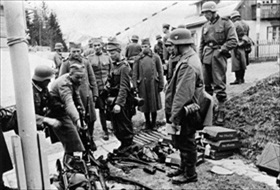 |  |
Left: Starting on April 6, 1941, Axis armies invaded Yugoslavia from all sides. This photo shows a Yugoslav infantry unit surrendering on the first day of war.
![]()
Right: Operation Punishment was the code name for the German bombing of Belgrade, Yugoslavia’s capital, which began on April 6, 1941 (Palm Sunday), and continued through April 10. Among the main targets of the Luftwaffe was the Yugoslav royal palace of King Peter II in downtown Belgrade.
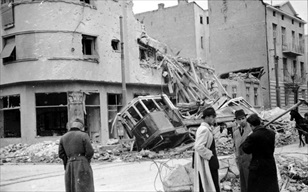 | 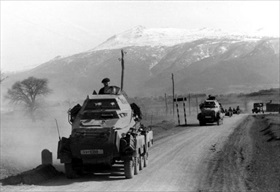 |
Left: A street damaged by the Luftwaffe’s bombing of Belgrade, April 1941. German Field Marshal Paul von Kleist said during the postwar Nuremberg Trials: “The air raid on Belgrade in 1941 had a primarily political-terrorist character and had nothing to do with the war. That air bombing was a matter of Hitler’s vanity, his personal revenge,” on the Yugoslav officers who overthrew Yugoslavia’s pro-Axis regent, Prince Paul.
![]()
Right: Armored cars of the 1st SS Division Leibstandarte SS Adolf Hitler advance into Greece, April 1941.
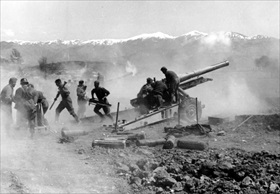 | 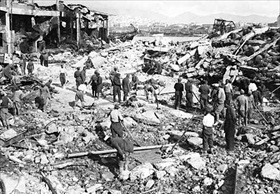 |
Left: German artillery firing during the advance into Greece, April 1941.
![]()
Right: Damage from the German bombing of Piraeus, Athens’ harbor, on April 6, 1941. During the bombing, a ship carrying nitroglycerin was hit, causing a huge explosion.
Yugoslavia During and After World War II
![]()

 History buffs, there is good news! The Daily Chronicles of World War II is now available as an ebook for $4.99 on Amazon.com. Containing a year’s worth of dated entries from this website, the ebook brings the story of this tumultuous era to life in a compelling, authoritative, and succinct manner. Featuring inventive navigation aids, the ebook enables readers to instantly move forward or backward by month and date to different dated entries. Simple and elegant! Click
History buffs, there is good news! The Daily Chronicles of World War II is now available as an ebook for $4.99 on Amazon.com. Containing a year’s worth of dated entries from this website, the ebook brings the story of this tumultuous era to life in a compelling, authoritative, and succinct manner. Featuring inventive navigation aids, the ebook enables readers to instantly move forward or backward by month and date to different dated entries. Simple and elegant! Click 











